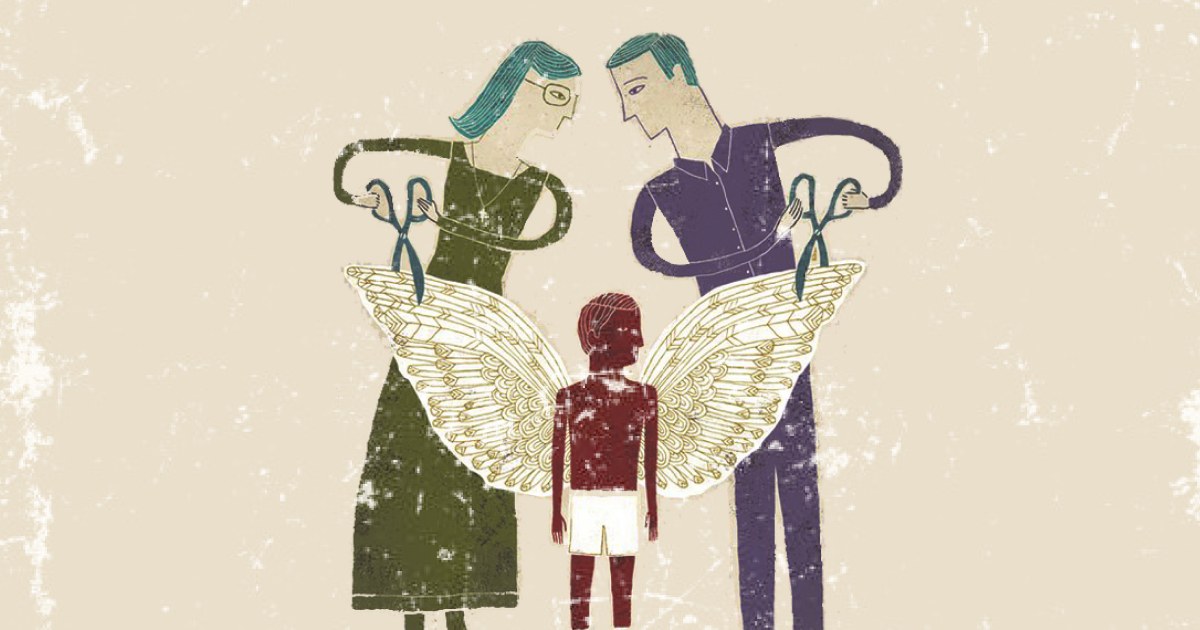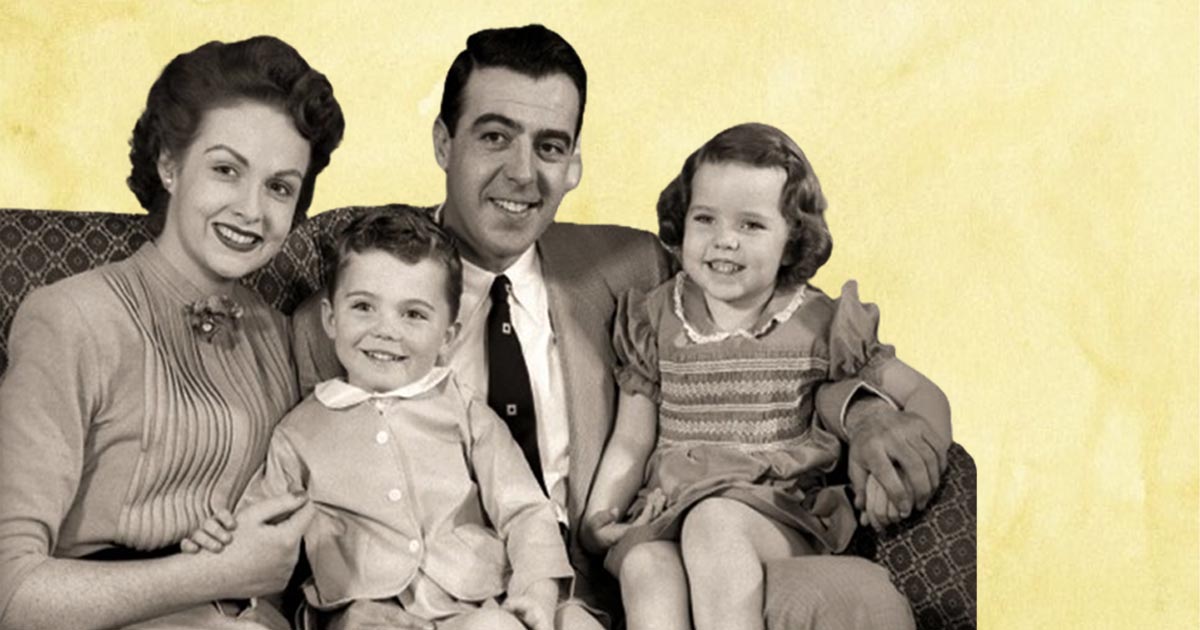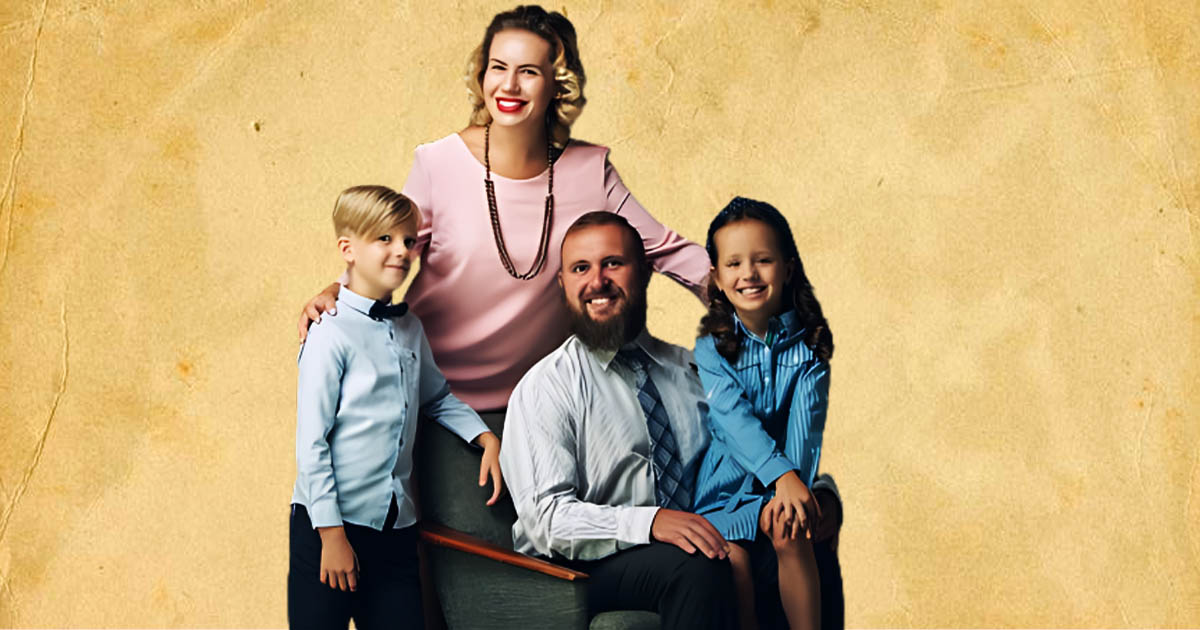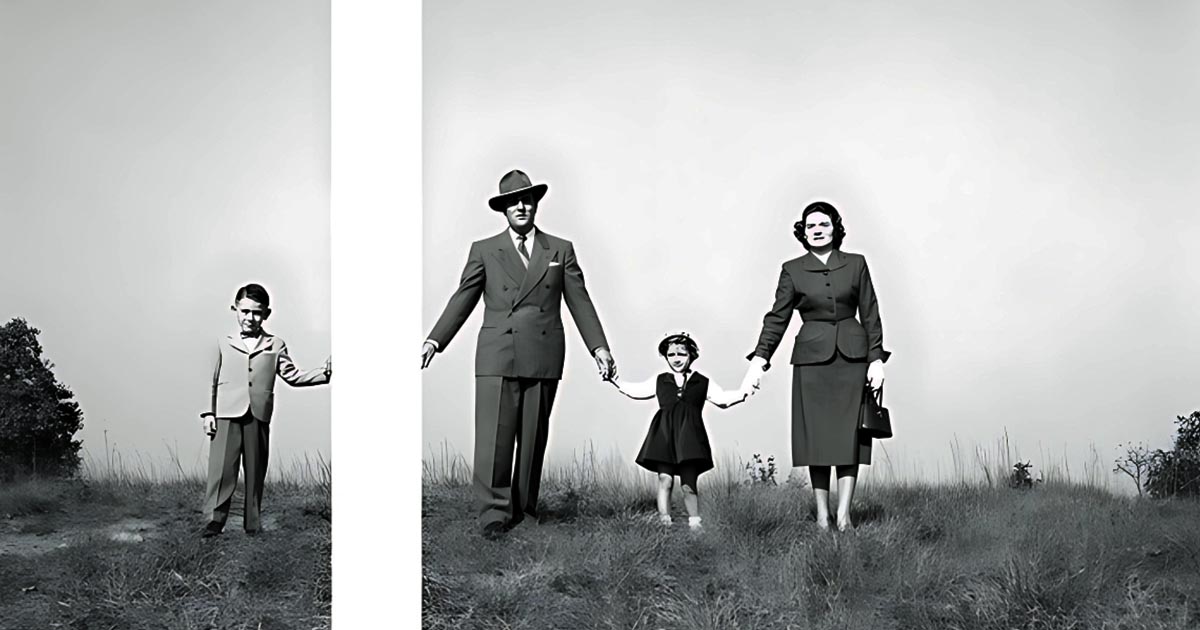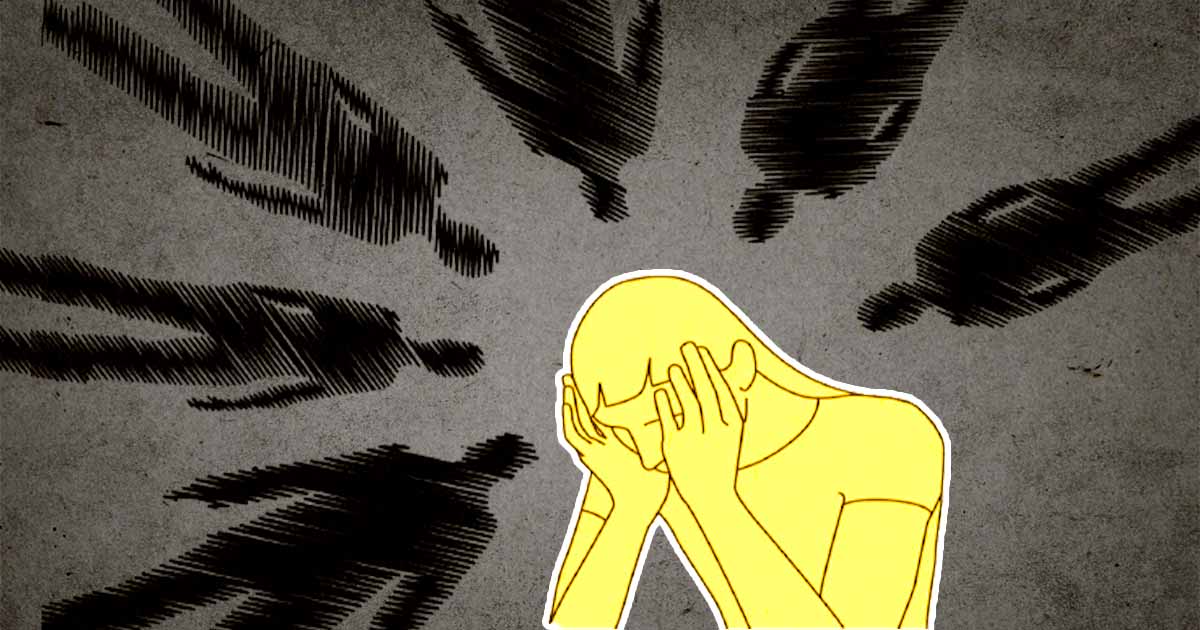While family often provides refuge and solace, for some, it can become a crucible of toxicity, leaving lasting scars. If you’ve ever questioned, what is a toxic family or wondered whether you are in one, you are not alone.
A toxic family is a family environment characterized by dysfunctional and harmful behaviors, relationships, and patterns of communication. In such families, there may be a lack of emotional support, constant criticism, manipulation, and controlling behaviors.
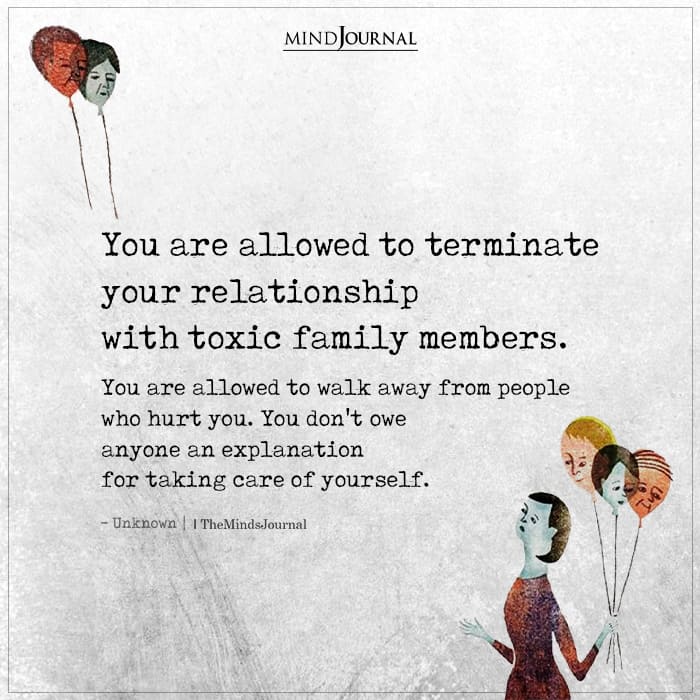
Signs of a toxic family are usually hidden beneath a facade of normalcy. The first step in breaking free from this vicious cycle is recognizing the signs.
These signs manifest not only in the family unit as a whole but also in individual members. After all, a chain is only as strong as its weakest link, and signs of a toxic family member can have a profound impact on your life.
We will explore what is a toxic family and uncover the signs of a toxic family. Furthermore, we will also explore the signs you grew up in a toxic family as well as learn how to deal with toxic people.
What is A Toxic Family
Dealing with a toxic family member or living in a toxic household can be challenging and emotionally draining, especially after understanding what is a toxic family.
Here are some signs of a toxic family that may indicate a toxic family dynamic:
1. Constant Criticism
One of the signs of a toxic family is that members often engage in continuous criticism and put-downs, belittling others’ achievements or abilities.
Research has shown that sustained exposure to such criticism within the family unit can have detrimental effects on one’s self-esteem, mental health, and overall well-being.
It creates an environment rife with negativity, making it challenging for individuals to flourish and thrive within their own homes.
2. Emotional Manipulation
They may use guilt, emotional blackmail, or manipulation to control others’ actions and decisions.
3. Lack of Boundaries
Toxic families often struggle to establish healthy boundaries, leading to intrusive and disrespectful behavior.
4. Blame and Deflection
Toxic family members may avoid taking responsibility for their actions by blaming others or deflecting the blame onto someone else is one of the most toxic signs of a family.
5. Controlling Behavior
They might attempt to control others’ lives, choices, and relationships, disregarding personal autonomy.
6. Emotional or Verbal Abuse
Toxic family environments may include emotional or verbal abuse, such as insults, shouting, and demeaning language.
7. Favoritism
Showing favoritism toward certain family members while disregarding or mistreating others can be a sign of toxicity.
8. Lack of Support
Toxic families often lack emotional support, and members may feel unheard or invalidated.
Studies have consistently shown that individuals growing up in such environments are more likely to experience heightened levels of stress, anxiety, and depression.
The absence of emotional support can also impede healthy emotional development and lead to issues with self-esteem and interpersonal relationships in adulthood.
9. Scapegoating
One family member may be consistently singled out and blamed for all problems within the family.
10. Gaslighting
Gaslighting is a form of manipulation where the toxic family member distorts the truth to make others question their reality or sanity.
Read More: What Is Gaslighting? 14 Warning Signs, Tips To Deal With It
11. Disregard for Feelings
Toxic family members may dismiss others’ feelings and emotions, making them feel invalidated.
12. Lack of Empathy
They might show little empathy or compassion for others’ struggles or difficulties.
13. Emotional Rollercoaster
Interactions with toxic family members can lead to emotional ups and downs, leaving individuals feeling drained and anxious.
It’s essential to recognize these signs of a toxic family to understand what is a toxic family and for prioritizing your well-being. If you find yourself dealing with a toxic family situation, seeking support from friends, therapists, or support groups can be beneficial.
Related: Why It’s Okay To Cut Off Toxic Family Members From Your Life
Setting boundaries and distance may also be necessary to protect your mental and emotional health once you acknowledge what is a toxic family.
Signs You Grew Up In A Toxic Family
It will be easier for you to understand what is a toxic family once you get to know about toxic family environments can vary from neglectful to outright abusive. Regardless of the specific type, one common thread is that your needs were not adequately met.
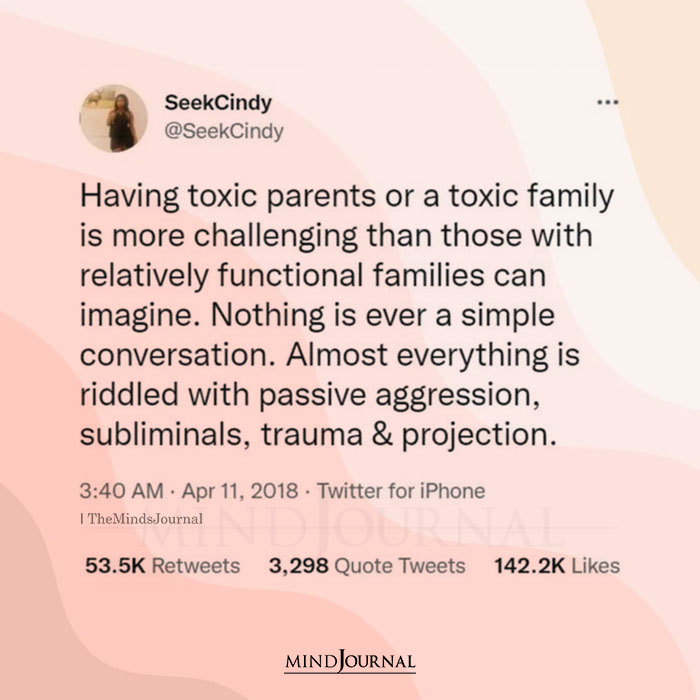
So, what are the signs you grew up in a toxic family? Here is your answer, read about all the signs you grew up in a toxic family below
1. Forever Eager to Please
Growing up in a tense and unpredictable family environment, you develop an instinct to avoid conflict at all costs. To keep the peace, you become exceptionally adept at reading others’ emotions and adapting your behavior accordingly.
Your own needs and desires take a backseat as you prioritize the happiness of those around you. As a result, people-pleasing becomes second nature to you. You find yourself saying yes to others’ requests, even when it inconveniences or compromises your own well-being.
Studies have indicated that this self-sacrificing behavior can result in feelings of overwhelm, exhaustion, and resentment as you consistently neglect your own needs and feelings.
2. Craving Validation
Growing up in a neglectful family where your emotional needs were unmet, you learned to seek validation from external sources to fill the void within.
The lack of attention and affirmation from your family made you crave validation from others as a means of feeling valued and worthy.
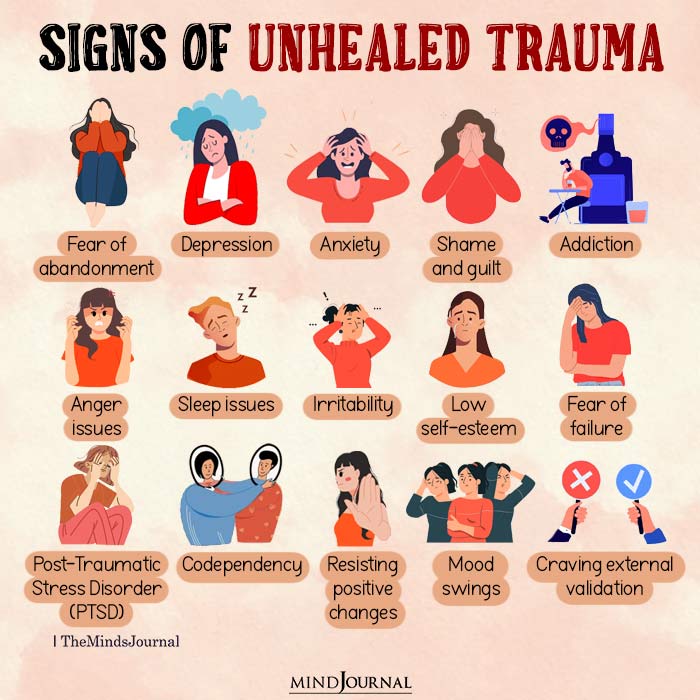
In your quest for validation, you might find yourself seeking approval from friends, colleagues, or romantic partners. Likes and compliments on social media become important markers of your self-worth, providing momentary relief from feelings of inadequacy.
Each positive interaction or sign of acceptance pleasantly surprises you, as you have grown accustomed to what is a toxic family, you reflect signs you grew up in a toxic family and expect very little recognition.
Read More: Mental Health Tips for Kids: 5 Powerful Parenting Strategies To Support Your Child’s Mental Health
3. The Suspicious Mind
Growing up in an environment where manipulation and deceit were prevalent, you became hyper-aware of others’ intentions. The constant exposure to deceptive behaviors in your family made you skeptical and cautious in your interactions with people.
Research suggests that constant exposure to manipulation in the family can lead to a heightened sensitivity to dishonesty in others, impacting adult relationships.
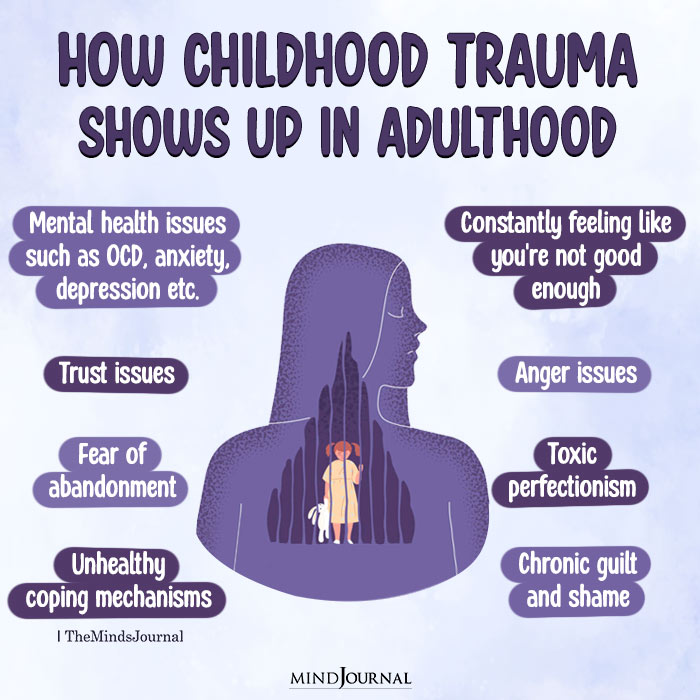
This exposure created a heightened sensitivity to any signs of dishonesty or ulterior motives in others. While this vigilance may have been a survival mechanism during your upbringing, it can become an ingrained pattern that affects your adult relationships.
As a result of your upbringing, you might find it challenging to trust others fully, even when they show genuine kindness or offer assistance. You may be constantly second-guessing their intentions, wondering if there’s an underlying motive behind their words or actions.
Remember, while your past experiences shaped you, they don’t define your future relationships. With time, self-awareness, and support, you can recognize what is a toxic family and cultivate more authentic connections and break free from the grip of constant suspicion.
Read More: What Are the Psychological Effects of Divorce on Kids? Grasping the Long-Term Impacts
4. Guarding Your Feelings
Growing up in an environment where criticism was prevalent can have a profound impact on one’s self-esteem and emotional well-being. Constantly facing judgment and negative feedback from family members can make you feel unworthy and inadequate.
You might internalize the criticism and start believing that you are not good enough, regardless of your achievements or efforts.
As a defense mechanism, you learn to hide your emotions to protect yourself from further hurt. You become guarded and cautious about expressing your true feelings and vulnerabilities.
Sharing your emotions or being open about your struggles can feel risky, as you fear being met with more criticism or rejection. Consequently, you build emotional walls, making it difficult for others to see the real you.
Related: How To Develop Emotional Stability: 5 Empowering Steps
Hiding your emotions might also stem from a fear of burdening others with your feelings or being seen as weak. You have grown accustomed to dealing with your emotions in isolation, avoiding any display of vulnerability.
This can lead to a sense of emotional isolation and loneliness, as you find it challenging to connect with others on a deeper, more authentic level.
Embracing your emotions and allowing yourself to be vulnerable are essential steps towards reclaiming your self-worth and experiencing more authentic and fulfilling relationships.
5. Confrontation Phobia:
Growing up in an environment where explosive reactions were a common occurrence, you learned to associate confrontation with danger and unpredictability.
Past traumas of facing anger, aggression, or emotional outbursts from family members replay in your mind, making you fearful of standing up for yourself or asserting your needs.
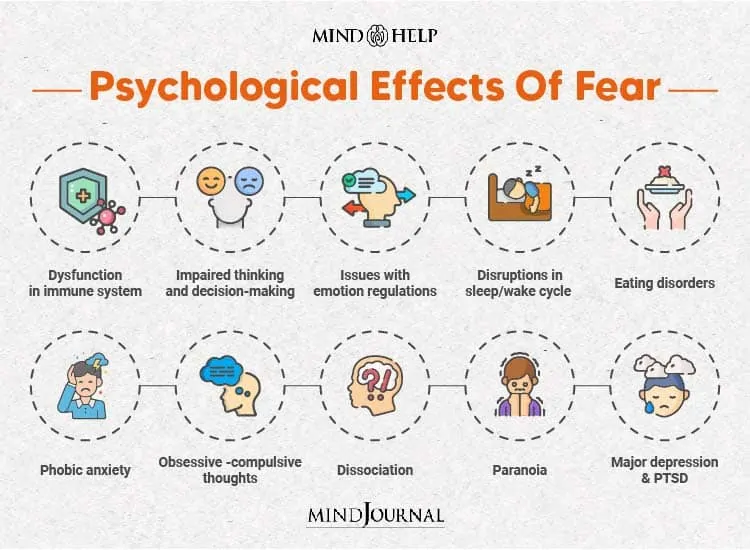
As a result, you avoid confrontation at all costs. The thought of expressing your opinions, setting boundaries, or disagreeing with others becomes anxiety-inducing.
The fear of triggering a negative reaction or facing emotional turmoil leads you to prioritize keeping the peace, even if it means suppressing your true feelings or going along with situations that make you uncomfortable.
The memories of past confrontations create a hypersensitivity to potential conflict in your present interactions. You might become hypervigilant, constantly scanning for signs of anger or disapproval in others’ words or body language.
Read More: What Are Phobias? 16 Signs, Causes, How To Overcome Phobia
6. The Indecision Dilemma
Growing up with harsh criticism from parents can have a devastating impact on your self-belief and self-confidence.
Constantly being told that you are not good enough or that your decisions are wrong can leave you feeling inadequate and doubtful of your abilities.
As a result, decision-making becomes an overwhelming struggle. The fear of making the wrong choice or facing criticism for your decisions can paralyze you with self-doubt.
You may find yourself second-guessing every option, analyzing potential outcomes endlessly, and feeling unable to make a definitive choice.
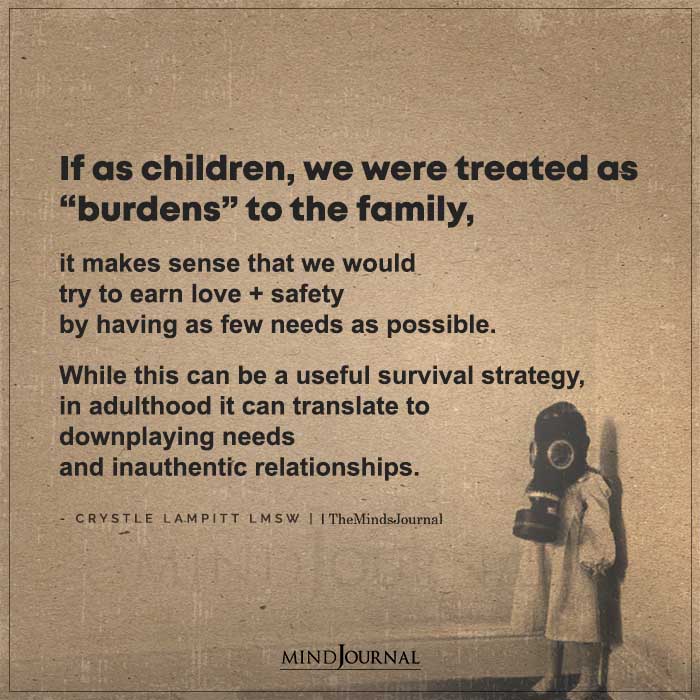
The fear of making mistakes can lead you to avoid taking risks and stepping outside your comfort zone. You might opt for the safe and familiar path, even if it means missing out on opportunities for growth and personal development.
Moreover, the negative self-beliefs resulting from harsh criticism can affect various aspects of your life. It can impact your relationships, career choices, and overall life satisfaction.
It becomes challenging to advocate for yourself, voice your opinions, or assert your needs, as you fear the potential criticism or rejection that may follow.
Read More: What Are Parenting Styles? Explore Different Types Of Parenting Styles And It’s Impact On Children
7. The Entitled Side
In certain toxic families, there may be a designated “golden child” or “special” member who receives preferential treatment and favoritism from parents or other family members.
This special treatment often comes at the expense of other siblings or family members, who may experience neglect, emotional abuse, or unfair treatment in comparison.
As the “special” member grows up, they may develop a sense of entitlement due to the consistent praise and privileges they received during childhood.
They might come to believe that they are inherently more deserving or superior to others, leading to an inflated sense of self-importance.
Read More: How To Raise A Child? 5 Step Guide For Raising Happy Kids
8. Love’s Illusive Chase
Growing up in an environment where love and nurturing were lacking can leave deep emotional wounds.
As a result, in adulthood, there is a yearning to fill this void by seeking the perfect relationship that will provide the love and care that was missing during childhood.
However, the quest for this idealized relationship can lead to the projection of unreal expectations onto partners. In the absence of experiencing healthy love and care during formative years, the individual may develop unrealistic beliefs about what a relationship should be like.

They might long for a partner who will unconditionally meet their emotional needs, provide constant validation, and never disappoint them.
Read More: Haunted By The Past: How Childhood Trauma Impacts Your Adult Relationships
They might view any imperfections or shortcomings as proof that the relationship is inadequate, reinforcing the belief that they are unlovable or unworthy of genuine affection.
In response to this disappointment, the person might move on from one relationship to another, constantly seeking that elusive connection they believe will heal their childhood wounds.
9. The Unforgiving Inner Critic
A harsh upbringing, characterized by constant criticism, emotional abuse, or neglect, can deeply impact a person’s self-esteem and inner dialogue.
Growing up in such an environment, the relentless negative messages from parents or caregivers become internalized, forming a critical and judgmental inner voice that constantly belittles and questions one’s worth.
As a child, you might have been repeatedly told that you are not good enough, worthless, or undeserving of love and care. These hurtful words and actions erode your self-esteem, leaving you with a deep sense of inadequacy and unworthiness.
The constant barrage of negativity creates a toxic inner dialogue that echoes the hurtful messages from your past.
This critical inner voice becomes a constant companion, casting doubt on your abilities, accomplishments, and even your value as a person. It leads you to second-guess your decisions, downplay your achievements, and magnify your perceived flaws and these are the signs you grew up in a toxic family.
As a result, positive self-esteem feels like an unattainable dream, as the negative self-talk overshadows any sense of self-worth.
Remember, your worth is not determined by your past or the critical inner voice. You are deserving of love, respect, and care, and with time and effort, you can break free from the grip of the negative self-talk and embrace a more positive and nurturing inner dialogue.
Growing up in a toxic family can leave lasting scars, but recognizing these signs empowers you to heal and build healthier relationships. Remember, you deserve love, support, and respect.
Signs Of A Toxic Family Member
Toxic behavior within families can take different forms, ranging from overt aggression to manipulative tactics. In some cases, toxic family members may resort to angry outbursts, destroying household items, and engaging in name-calling or bullying as a means of exerting control and dominance over others.
Research has indicated that toxic family members may resort to destructive actions like angry outbursts, breaking household items, name-calling, and bullying to assert control and dominance over others.
These manipulative tactics are designed to maintain power and control over you, leaving you feeling emotionally drained and undermined.
What makes a family member dynamic toxic is not just the individual toxic behavior, but also how other family members respond to it.
Read More: What Are Family Dynamics? Is Your Family Dynamics Uplifting or Weighing You Down?
Signs of a toxic family member can be emotionally distressing and challenging to navigate. Recognizing these signs is crucial for protecting your well-being and establishing healthy boundaries within the family dynamic. Here are some of the relevant signs of a toxic family member to watch out and be aware of what is a toxic family
- Some toxic family members exhibit aggressive behavior, resorting to angry outbursts.
- Toxic individuals may hold others to different standards than they hold themselves.
- Toxic family members may frequently invalidate your experiences and emotions, dismissing your concerns or telling you that you’re overreacting.
- Toxic family members rarely take responsibility for their actions and instead shift blame onto others.
- Toxic individuals may harbor jealousy and a competitive attitude towards other family members.
Recognizing these signs of a toxic family member is the first step towards protecting yourself from the negative impact of toxic family dynamics.
Establishing boundaries and seeking support from friends, counselors, or support groups can be instrumental in navigating challenging family relationships.
Read More: What Is Dysfunctional Family And How To Deal With It
Signs Of A Toxic Sibling
Sibling relationships evolve. As children, you may have shared toys, created elaborate forts, and united against parental rules. As you grew older, your siblings became trusted confidants, and the thought of them now evokes a rush of emotions.
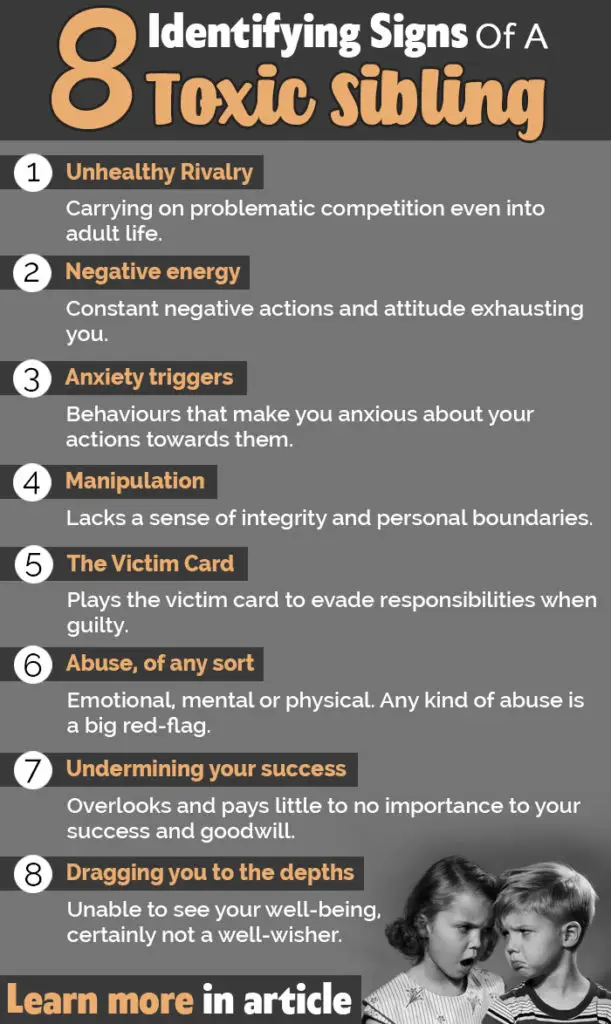
You should consider yourself lucky to have a brother or sister. There is always someone to have your back and someone you can rely on. At least, that’s how things should be, right?
But what about the situations where one of the siblings is toxic and he or she is just an example of what is a toxic family and shows signs of a toxic sibling. If you suspect that you have a toxic sibling, check out these signs of a toxic sibling
1. Overly Critical:
Siblings who grew up in a household with constant criticism may adopt this approach and become overly critical themselves.
They may pick on your flaws, point out perceived weaknesses, and hurl sharp criticisms your way, leaving you feeling hurt and attacked, showing immense signs of a toxic sibling.
2. Manipulative:
Manipulation is an attempt to control, and toxic siblings may use various tactics to get their way. They might play the victim, framing situations to make themselves look favorable, or guilt-trip you into doing things for them.
3. Dishonest:
While some dishonesty can be expected during childhood, chronic lying and deception are concerning signs. It may indicate a lack of space for truthfulness in their upbringing, where they learned that being accepted and loved meant telling the family what they wanted to hear.
4. Repeat Offenders:
Identifying signs of a toxic sibling in your sibling and bringing them to your sibling’s attention should ideally lead to change. However, if your sibling continues with the same harmful behavior despite being aware of its impact, that’s a significant red flag.
Persistent negative actions, such as verbal abuse or aggressive behavior, should not be excused or tolerated.
5. Overly Competitive:
Toxicity in sibling relationships can lead to jealousy and competition, especially if there is a perceived preference from parents toward one child.
These feelings of resentment may drive siblings to outshine each other or vie for recognition, which can strain the sibling bond.
Dealing with toxic siblings requires observing signs of a toxic sibling, setting firm boundaries, and prioritizing your well-being.
If you find yourself in such a situation, consider seeking support from friends, therapists, or support groups to navigate the challenges.
How To Deal With Toxic People
Refusing to tolerate toxic love is essential and this is possible once you know what is a toxic family. The initial step towards how to deal with toxic people includes regaining control and fostering healthy family practices involves identifying signs of a toxic family.
The subsequent step of how to deal with toxic people is to acquire skills in implementing new communication and behaviors within the family. The following strategies can aid in overcoming or restructuring toxic family dynamics and facilitate positive change.
Dealing with toxic family members or toxic people can be emotionally challenging, but it is essential for your mental and emotional well-being. Here are some strategies regarding how to deal with toxic people to help you navigate these difficult relationships:
Set Boundaries
Establish clear boundaries with toxic family members or individuals. Determine what is a toxic family behavior and what it is acceptable and what is not, and communicate these boundaries assertively but calmly.
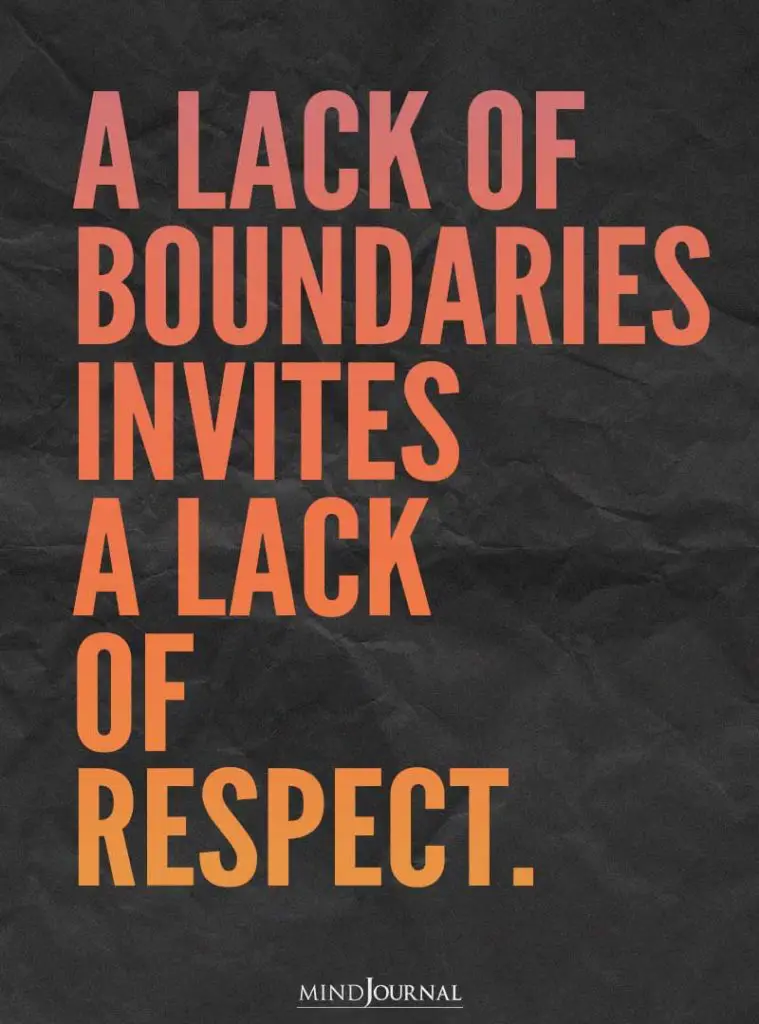
Be consistent in enforcing these boundaries to protect yourself from emotional harm.
Practice Self-Care
Engage in self-care activities that promote your emotional and physical well-being. Take time for yourself, indulge in hobbies, exercise, meditate, or spend time with supportive friends.
Taking care of yourself will help build emotional resilience in dealing with toxic individuals.
Refocus on Positivity
Focus on the positive aspects of your life and relationships. Surround yourself with people who uplift and support you, and engage in activities that bring you joy and fulfillment.
Avoid Engaging in Arguments
Toxic individuals may try to provoke you into arguments or conflicts. Avoid engaging in heated discussions, as it often leads to further negativity and stress. Practice letting go of the need to prove yourself right or change their opinion.
Learn to Say No
Be firm in saying no to requests or demands that feel manipulative or exploitative. Prioritize your needs and well-being, and don’t feel guilty for asserting your boundaries.
Accept Imperfections
Recognize that no family or person is perfect. Everyone has flaws and shortcomings. Accepting this reality can help you manage your expectations and reduce frustration in dealing with toxic individuals.
Seek Support
Reach out to friends, support groups, or therapists who can provide a safe space to talk about your experiences and emotions. Sharing your feelings with someone empathetic can be cathartic and help you gain perspective on the situation.
Focus on Personal Growth
After learning so much about what is a toxic family, try to invest in your personal growth and development as it will help when it comes to how to deal with toxic people.
Set goals, pursue education or new skills, and work towards becoming the best version of yourself. This can help you build confidence and empower you in dealing with toxic family members.
You cannot change others, but you can control how you respond to their behavior.
By implementing these strategies, you won’t have to ask anyone how to deal with toxic people, you just have to navigate toxic relationships more effectively and build a life filled with positivity and healthy connections.
Read More: 10 Subtle Signs Your Family Hates You And How To Deal With Them!
Frequently Asked Questions (FAQs)
1. Why do family members become toxic?
Unconsciously, many of us carry unmet needs and unknowingly project them onto others, leading to toxic behavior. This lack of self-awareness regarding our own needs can be the reason why painful interactions with family members have such a profound impact on us.
2. Can a toxic family affect your mental health?
Growing up in an unhealthy or toxic family environment can lead to various emotional, interpersonal, and mental health difficulties that can be addressed through therapy. For instance, experiencing control or manipulation might hinder your decision-making abilities.
3. How do you know if you’re toxic?
A toxic individual is someone who consistently exhibits behaviors and actions that cause harm or have a negative impact on others’ lives. They often play a central role in fostering toxic relationships
